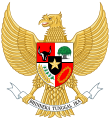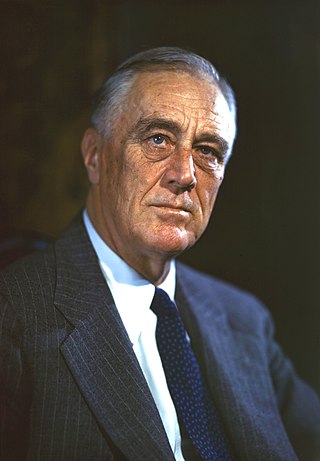
Franklin Delano Roosevelt, commonly known by his initials FDR, was an American statesman and politician who served as the 32nd president of the United States from 1933 until his death in 1945. He was a member of the Democratic Party and is the only U.S. president to have served more than two terms. His initial two terms were centered on combating the Great Depression, while his third and fourth saw him shift his focus to America's involvement in World War II.
FDR, or Franklin D. Roosevelt (1882–1945), was president of the United States from 1933 to 1945.

The 1944 United States presidential election was the 40th quadrennial presidential election. It was held on Tuesday, November 7, 1944. The election took place during World War II, which ended the following year. Incumbent Democratic President Franklin D. Roosevelt defeated Republican Thomas E. Dewey to win an unprecedented fourth term. It was also the fifth presidential election in which both major party candidates were registered in the same home state; the others have been in 1860, 1904, 1920, 1940, and 2016.

The Farabundo Martí National Liberation Front is a Salvadoran political party and former guerrilla rebel group.

The Franklin Delano Roosevelt Memorial is a presidential memorial in Washington D.C., dedicated to the memory of Franklin Delano Roosevelt, the 32nd president of the United States, and to the era he represents. The memorial is one of two in Washington honoring Roosevelt.

The Communist Party of Indonesia was a communist party in the Dutch East Indies and later Indonesia. It was the largest non-ruling communist party in the world before its violent disbandment in 1965. The party had two million members in the 1955 elections, with 16 percent of the national vote and almost 30 percent of the vote in East Java. During most of the period immediately following the Indonesian Independence until the eradication of the PKI in 1965, it was a legal party operating openly in the country.
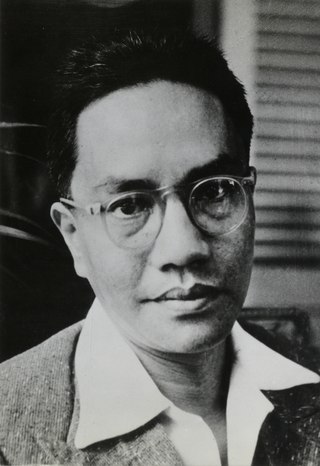
Amir Sjarifuddin Harahap was an Indonesian politician and journalist who served as the second prime minister of Indonesia from 1947 until 1948. A major leader of the left wing during the Indonesian National Revolution, he previously served as Minister of Information from 1945 until 1946 and Minister of Defense from 1945 until 1948. Amir was born into the Sumatran aristocracy and was educated at Leiden University. At Leiden, he became a member of the board of the Gymnasium student association in Haarlem and was involved in the Batak student organization Jong Batak. He returned to Indonesia due to family troubles but continued his education at the Rechts Hogeschool in Batavia.
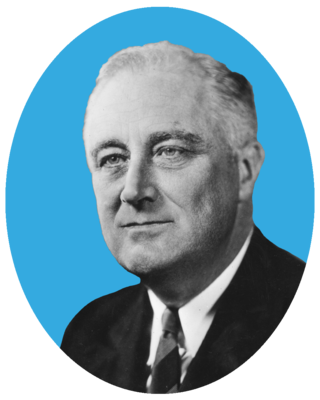
The 1940 Democratic National Convention was held at the Chicago Stadium in Chicago, Illinois from July 15 to July 18, 1940. The convention resulted in the nomination of President Franklin D. Roosevelt for an unprecedented third term. Secretary of Agriculture Henry A. Wallace from Iowa was nominated for vice president.
The 1940 Republican National Convention was held in Philadelphia, Pennsylvania, from June 24 to June 28, 1940. It nominated Wendell Willkie of New York for president and Senator Charles McNary of Oregon for vice president.

Legislative elections were held in El Salvador on 18 January 2009. The leftist Farabundo Martí National Liberation Front (FMLN) was widely expected to win the most seats for the first time against the nationalist conservative Nationalist Republican Alliance (ARENA). As a result of the election, the Revolutionary Democratic Front, a left-wing party founded by FMLN dissidents in 2006 with the same name and symbols as the historic FDR from the Salvadoran Civil War, was deregistered as a political party as it failed to gain either a seat or 50,000 votes, as necessary to sustain registration. All parties contested the election in all departments, except for the FDR, which did not contest the election in three departments and stood jointly with the PDC in two others.

The Madiun Affair, known locally as the Communist Party of Indonesia rebellion of 1948, was an armed conflict between the government of the self-proclaimed Republic of Indonesia and the left-wing opposition group Front Demokrasi Rakyat during the Indonesian National Revolution. The conflict began on September 18, 1948, in Madiun, East Java, and ended three months later when most FDR leaders and members were detained and executed by TNI forces.
The Patriot Party was a political party in Indonesia. It was established as the Pancasila Patriot's Party as a result of a deliberations at the sixth national conference of the Pancasila Youth organization in 1996. At the time, the organization's political goals were channeled by Golkar, but in its conference the year after the 1998 Fall of Suharto, Pancasila Youth withdrew from Golkar. The conference also decided the time was right to establish a political party, and it was declared on 1 June 2001, the anniversary of Sukarno's Pancasila speech. The party was officially and legally established two years later. Thus the Patriot Party was described as the political wing of the Pancasila Youth.

The First Hatta Cabinet was Indonesia's seventh cabinet. It was formed by Vice President Mohammad Hatta, who was instructed to do so by President Sukarno on 23 January 1948, the same day the previous cabinet was declared dissolved. Following the second Dutch military aggression, when the republican capital of Yogyakarta was seized and most of the cabinet arrested, much of the cabinet was captured and sent into exile, although it was not formally disbanded. After the political leadership returned effective 13 July 1949 the cabinet continued its mandate until it was reshuffled on 4 August.
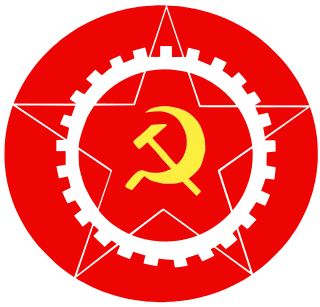
The Labour Party of Indonesia was a political party in Indonesia.

The Central All-Indonesian Workers Organization was the largest trade union federation in Indonesia. Founded during the period of the country's independence in the late 1940s, the federation grew rapidly in the 1950s. It was initially formed with loose connections to the Communist Party of Indonesia (PKI) and with members from other parties, but over time, the PKI became dominant in the organisation. With the introduction of President Sukarno's guided democracy in the late 1950s, SOBSI was formally recognised and given a place in the national decision-making structures. In the 1960s, SOBSI came into conflict with the Army, whose officers controlled the country's state enterprises. After the 1965 coup that subsequently produced Suharto's New Order regime, SOBSI was declared illegal, its members killed and imprisoned and most of the leadership executed.
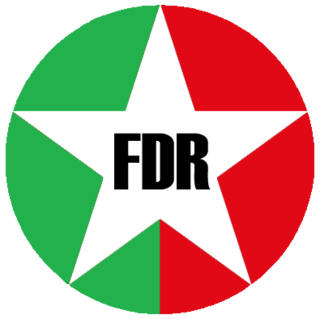
The Democratic Revolutionary Front – New Alternative was a right-centrist electoral political alliance in Bolivia.
This bibliography of Franklin D. Roosevelt is a selective list of scholarly works about Franklin D. Roosevelt, the thirty-second president of the United States (1933–1945).

The 1944 United States presidential election in North Carolina took place on November 7, 1944, as part of the 1944 United States presidential election. North Carolina voters chose 14 representatives, or electors, to the Electoral College, who voted for president and vice president.
Fachrul Baraqbah (1925–1980) was an Indonesian politician who was a member of the Kutai Sultanate royal family and was a mid-level leader of the Communist Party of Indonesia (PKI) until his arrest in 1965 during the anti-communist repression preceding the Transition to the New Order. As an aristocrat, he was considered an anomaly for supporting the Indonesian National Revolution, renouncing his royal title, and joining the PKI.

Pancasila is the official, foundational philosophical theory of Indonesia. The name is made from two words originally derived from Sanskrit: "pañca" ("five") and "śīla".
